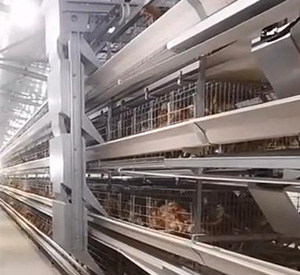Application of laying hen cages in Uganda
- font size
- Be the first to comment!
Uganda is a country in East Africa with relatively backward agricultural development. However, in recent years, Uganda's poultry breeding industry has made significant progress, and the application of laying hen cages has become a major breeding method.
The laying hen cage in Uganda is an efficient, space-saving breeding facility that can accommodate a large number of laying hens, provides a suitable living environment, and facilitates egg management and collection. Ugandan farmers gradually realized the advantages of laying hen cages and began to use them widely.
First of all, the application of laying hen cages in Uganda has enabled the scale and intensification of Uganda’s poultry farming industry. Through reasonable planning and layout, farmers can make full use of limited land resources, raise more laying hens, and increase production. In addition, the management and operation of laying hen cages are relatively simple, allowing farmers to better master breeding techniques and improve breeding efficiency.

Secondly, the application of laying hen cages in Uganda improves the production efficiency of laying hens. The laying hen cage provides a suitable living environment for the laying hens, including suitable temperature, humidity, light and other conditions, so that the laying hens can grow and produce eggs better. In addition, the design of the laying hen cage also takes into account the behavioral characteristics of the laying hens, providing a comfortable space and suitable feed supply, further improving the production efficiency of the laying hens.
Finally, the application of laying hen cagesin Uganda has improved the poultry farming environment in Uganda. Traditional poultry farming methods often have problems with hygiene and environmental pollution, and the use of laying hen cages can effectively control the spread of diseases and fecal emissions, and reduce environmental pollution. In addition, the application of laying hen cages also reduces manual labor intensity and provides farmers with better working conditions.
In short, the use of laying hen cages for poultry farming in Uganda has achieved remarkable results. The application of laying hen cages has enabled the scale and intensification of the breeding industry, improved the production efficiency of laying hens, and improved the breeding environment. These developments provide more economic income for Ugandan farmers and promote the development of local agriculture.


